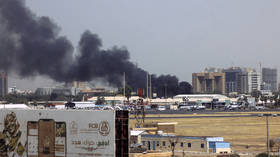Death toll grows in Sudan clashes
Hospitals are running out of critical supplies amid the ongoing bloodshed, WHO said
At least 83 people have been killed and over 1,126 injured in clashes across Sudan, the World Health Organization said on Sunday evening, warning of a looming healthcare crisis and urging the Sudanese Armed Forces (SAF) and the Rapid Support Forces (RSF) to at least ensure unrestricted access to hospitals, after a UN-proposed brief humanitarian ceasefire failed to hold.
“Supplies distributed by WHO to health facilities prior to this recent escalation of conflict are now exhausted, and many of the nine hospitals in Khartoum receiving injured civilians are reporting shortages of blood, transfusion equipment, intravenous fluids, medical supplies, and other life-saving commodities,” the agency said in a statement on Sunday. It also noted reports of water and power cuts, fuel shortages, and the lack of specialized medical personnel.
The UN World Food Programme said it was forced to halt its operations in the country after three of its employees were killed and two more injured, and a WFP-operated aircraft was “significantly damaged” during clashes at the Khartoum International Airport.
The warring sides agreed to a brief humanitarian pause on Sunday afternoon, but maintained the right to “respond in the event of transgressions.” Sounds of heavy artillery and gunfire were still heard in various parts of the capital during that time.
“The whole purpose of the three-hour ceasefire period was to allow those who were trapped around the vicinity of the presidential palace, around the vicinity of the general command of the army to be able to escape,” according to Al Jazeera reporter Hiba Morgan.
On Saturday, clashes broke out in the capital Khartoum and other cities between the SAF and the RSF, an independent security branch with roots in pro-government militias. Each side has accused the other of starting hostilities, while making conflicting claims on their gains. The exact power balance on the ground remains unclear, with the international community in unison calling for a ceasefire and negotiations.
In 2019, Omar al-Bashir, Sudan’s ruler of more than 25 years, was overthrown in a coup. The country has since been governed by the Transitional Sovereignty Council (TSC) that was briefly dissolved and then reinstated in the wake of another coup in 2021. Its president – and de facto ruler of the nation – is army Chief General Abdel Fattah Al-Burhan. RSF commander General Mohamed Hamdan Dagalo, also known as Hemedti, is the deputy chairman.
You can share this story on social media:








Comments are closed.